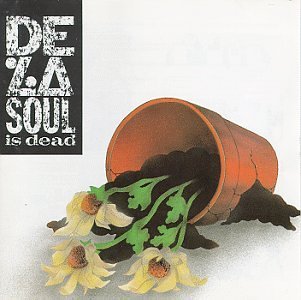“3 Feet High and Rising” remains De La Soul’s most noted album, and deservedly so. As fleeting as the D.A.I.S.Y. era was, it was a revolutionary movement; three hippies rapping about peace and love was already something of an alternative to hip-hop in 1989, but in many ways it was also the calm before the storm. The ’90’s ushered in a sudden wave of grit and violence to hip-hop, effectively making the Native Tongues posse the very definition of “alternative” rap. With G-funk pushing hip-hop westward, “3 Feet” looked all the more unique. Within time, it became recognized as one of the most important rap albums ever recorded, even earning a place in the Rock & Roll Hall of Fame, an honor only a handful of hip-hoppers share.
“3 Feet” was and is an excellent listen, and probably an even better state of mind, but it isn’t the reason De La Soul is so highly thought of today. By 1991, tie-dyed t-shirts and tripped-out music videos were clearly the last thing on their agenda. Barely old enough to drink, Pos, Dove and Mace were seasoned, sarcastic veterans, tired of representing a stereotype and disappointed in the ignorance surrounding them. With a world of hardship weighing them down, a screw popped loose in the form of “De La Soul Is Dead.”
De La have many faces, each as engaging as the other, but it’s their sophomore album that makes their body of work particularly diverse. A decidedly darker, edgier side of the trio had suddenly emerged, literally illustrated by the shattered pot of dead daisies on the album’s cover. Feel-good tunes like “Me, Myself and I” were all but a shadow of the past, replaced with depressive themes and dry humor like in the lead single “Ring, Ring, Ring.” Ostensibly cheery with its upbeat soul and 70’s horns, it deals with the group’s frustrations with incompetent wannabes and their endless demo tapes. At over six minutes long and with a hilarious skit to boot, the point is well taken.
Seeing it takes an attentive listen to really grasp what the Plugs are often saying, it’s no surprise that the album’s initial response was mixed, and sales failed to reach expectations. The other single “Keepin’ the Faith,” with its indirect references and harmlessly funky melody, flew clear over the heads of casual listeners, being something of an advanced version of Kanye West’s “Gold Digger.” “Afro Connections At A Hi 5,” one of the very first songs to call studio gangstas into question, also criticized the acts De La believed had “fell the fuck off.” Posdnuos comes especially acidic, imitating clichéd rap thugs by holding his crotch and “eating the watermelon tic-tac.” “My Brother’s A Basehead,” even with the most playful piano loop I’ve ever heard, is easily the darkest song of the album, Posdnuos narrating the tale of his junkie brother and his struggles with cocaine addiction.
Prince Paul, a producing pioneer and as much a part of early De La as Plugs One and Two ever were, was at a startling peak form for “De La Soul Is Dead.” “Oodles of O’s” is a stand out on an outstanding LP, a classic thumper that wowed one friend of mine as recently as this last year. “A Roller Skating Jam Named Saturday’s,” with Q-Tip lending a guest verse, is the smoothest track of the album, Paul meshing several groovy loops and even splicing the theme from Grease. “Pease Porridge,” behind an infectious clacking possibly sampled from the Harlem Globetrotters theme and arguably the illest loop Prince Paul has EVER dug up, makes my list of the best beats of all time. Paul brought sampling to new level of creativity on “De La Soul Is Dead,” making a lasting impression on beat-makers the world over while maintaining his priceless sense of humor. Truth be told, his SAMPLES have been sampled time and time again.
The measure of De La Soul’s greatness depends on what kind of fan you are. There are the old school “3 Feet” heads, religious “Stakes Is High” followers, and even some that prefer the more futuristic sounds of the AOI movement. Our own Jordan Selbo, perhaps the biggest De La fan of our beloved staff, has placed his allegiance behind “Buhloone Mindstate,” the most slept-on of their albums and Prince Paul’s swan song with them. Plugs one, two and three always spoke to someone, no matter what album was in the deck. Their open-mindedness is virtually unparalleled in all of music, and their acclaim is just as staggering; go ‘head and check the scores in the RapReviews archives; we certainly don’t mind ’em.
Perhaps this versatility is what makes De La Soul so legendary. In constantly evolving, yet somehow sticking to the same script and striking totally different chords with thousands of different fans, they are the closest thing hip-hop has ever had to the Beatles, more so than Wu-Tang Clan or A Tribe Called Quest could even hope for. “De La Soul Is Dead,” a funky, caustic social commentary and one of the very greatest hip-hop albums ever made, is what gave them the balls to keep pushing the envelope. If not that, it’s just another stroke of brilliance in a very long line.

